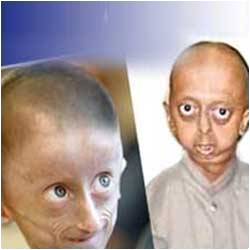Spns1 gene was found to induce degradation and premature aging while atp6vca gene was found to suppress the effects of Spns1 gene.

- Two genes associated with premature aging were identified by a research team from the Scripps Research Institute.
- Defects in the Spns1 (Sphingolipid Transporter 1 (putative)) gene induce degradation and premature aging while corresponding defects in atp6v0ca gene was found to suppress the effects of Spns1(Sphingolipid Transporter 1 (putative)) gene.
- The balance in function between the two genes will prevent premature aging
- Spns1- Induces degradation and premature aging
- atp6v0ca- Suppresses the degradation caused by Spns1 (Sphingolipid Transporter 1 (putative))
Aging is associated with increase in wrinkles, loss of fat, thinning of skin, loss of hair amongst others, however, in premature aging, these symptoms could occur at a much earlier age. An individual who shows signs of premature aging could be at an increased risk for disease found in older people and could also undergo emotional issues that affect mental health.
Associate Professor Dr.Shuji Kishi who is the lead author of the study said “We found that the dual defects did indeed counteract senescence during development and extended the animal's survival and life span."
This study will aid in highlighting the body’s inability to dispose the build-up of harmful chemicals and could fuel further research on ways to prevent such build ups.
Autophagy
The protein encoded by the gene spns1 is involved in autophagy in mammals like zebra fish and humans. Autophagy helps to
- remove misfolded and aggregated protein
- Clear organelles that are damaged within the cell
- Eliminate intracellular pathogens
- Specifically or non-specifically remove organelles and protein aggregates
There should be a balance between the genes that will aid in preventing premature aging. An insight into this balance will provide clues to lysosomal diseases, where the accumulation of waste products results in vacuoles in the lysosome.
The age of onset, severity of the disease as well as the inclusion of the central nervous system manifestation can vary within the disease. There are over 50 lysosomal diseases which include Pompe disease, Tay Sach’s, Gaucher and Salla. These lysosomal diseases have infantile, juvenile and adult forms of disease.
The severity of the disease depends on the type of waste stored in the lysosomes. In Pompe disease, there is accumulation of glycogen in the lysosome which leads to muscle weakness.
The genes that have been identified in the suppression of premature aging could be involved in the synthesis of hormones which could aid in the removal of waste from the lysozyme. Dr. Shanshan Lian who is a research associate and one of the first author of the study said "The use of appropriate inhibitors, selective for key steps in the biosynthesis of cellular macromolecules in general, may restore normal dynamics in the autolysosomal compartment and correct the pathological storage that is the ultimate cause of these types of disease.”
The current study will also aid in
- Identifying new genes which could affect the aging process.
- High throughput analysis of pharmacological factors which could accelerate aging like oxygen radicals.
There are many factors that contribute to premature aging
- Genes
- DNA methylation
- Metabolic Stress
- Environmental factors
Aging has always been a condition that is wrought with worry about good physical and mental health. There has been an increase in the number of years an individual lives with the advent of technology but there has not been an increase in the quality of life lead due to age related diseases. Studies such as these could help in lowering the risk for disease and improving health during advanced years of life.
References:
- Autophagy: cellular and molecular mechanisms - (https://www.ncbi.nlm.nih.gov/pmc/articles/PMC2990190/)
- Lysosomal Storage Disorders - (https://www.ncbi.nlm.nih.gov/books/NBK6177/)
- Aging: The Biology of Senescence - (https://www.ncbi.nlm.nih.gov/books/NBK10041/)
- Cellular Mechanisms of Somatic Stem Cell Aging - (https://www.ncbi.nlm.nih.gov/pmc/articles/PMC3982593/)
Source-Medindia














